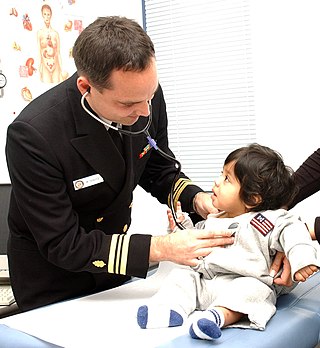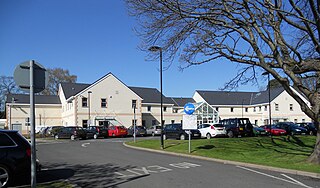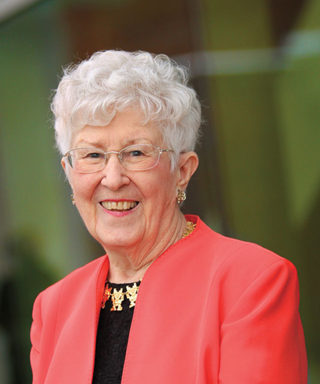
A registered nurse (RN) is a nurse who has graduated or successfully passed a nursing program from a recognized nursing school and met the requirements outlined by a country, state, province or similar government-authorized licensing body to obtain a nursing license. An RN's scope of practice is determined by legislation, and is regulated by a professional body or council.
Pediatric nursing is part of the nursing profession, specifically revolving around the care of neonates and children up to adolescence. The word, pediatrics, comes from the Greek words 'paedia' (child) and 'iatrike' (physician). 'Paediatrics' is the British/Australian spelling, while 'pediatrics' is the American spelling.

A nurse practitioner (NP) is an advanced practice registered nurse and a type of mid-level practitioner. NPs are trained to assess patient needs, order and interpret diagnostic and laboratory tests, diagnose disease, formulate and prescribe medications and treatment plans. NP training covers basic disease prevention, coordination of care, and health promotion.
Health visitors are professional individuals engaged in public health work within the domestic setting, predominantly found in countries with state-funded health systems. They are distinct from district nurses, who provide clinical healthcare, domestically.
District Nurses work manage care within the community and lead teams of community nurses and support workers. The role requires registered nurses to take a NMC approved specialist practitioner course. Duties generally include visiting house-bound patients and providing advice and care such as palliative care, wound management, catheter and continence care and medication support. Their work involves both follow-up care for recently discharged hospital inpatients and longer-term care for chronically ill patients who may be referred by many other services, as well as working collaboratively with general practitioners in preventing unnecessary or avoidable hospital admissions.
Nursing credentials and certifications are the various credentials and certifications that a person must have to practice nursing legally. Nurses' postnominal letters reflect their credentials—that is, their achievements in nursing education, licensure, certification, and fellowship. The letters usually appear in the following order:
Nursing in the United Kingdom has a long history. The current form of nursing is often considered as beginning with Florence Nightingale who pioneered modern nursing. Nightingale initiated formal schools of nursing in the United Kingdom in the late 19th and early 20th centuries. The role and perception of nursing has dramatically changed from that of a handmaiden to the doctor to professionals in their own right. There are over 700,000 nurses in the United Kingdom and they work in a variety of settings, such as hospitals, health centres, nursing homes, hospices, communities, military, prisons, and academia, with most working for the National Health Service (NHS). Nurses work across all demographics and requirements of the public: adults, children, mental health, and learning disability. Nurses work in a range of specialties from the broad areas of medicine, surgery, theatres, and investigative sciences such as imaging. Nurses also work in large areas of sub-specialities such as respiratory, diabetes, cancer, neurology, infectious diseases, liver, research, cardiac, women's health, sexual health, emergency and acute care, gastrointestinal, infection prevention and control, neuroscience, ophthalmic, pain and palliative, and rheumatology. Nurses often work in multi-disciplinary teams but increasingly are found working independently.

Dame Elizabeth Nneka Anionwu is a British nurse, health care administrator, lecturer, and Emeritus Professor of Nursing at the University of West London.

The Queen's Nursing Institute (QNI) is a charity that works to improve the nursing care of people in their own homes in England, Wales, and Northern Ireland. It does not operate in Scotland, where the Queen's Nursing Institute Scotland performs a similar function. The QNI is also affiliated to the Queen's Institute of District Nursing in Ireland. The QNI is a member of the International Council of Nurses.

Georgetown UniversitySchool of Nursing is one of the eleven schools of Georgetown University. Founded in 1903 as the School of Nursing, it added three other health related majors in 1999 and appended its name to become the School of Nursing & Health Studies. In 2022, the school returned to the name School of Nursing, as the School of Health was divided from it. The school has been at the forefront of education in the health care field, offering many programs unique to America's elite institutions. Offering undergraduate and graduate programs in the health sciences, graduates are prepared to enter the complex fields of medicine, law, health policy, and nursing. The School of Nursing is made up of the Department of Health Systems Administration, the Department of Human Science, the Department of International Health, and the Department of Nursing.

Monnow Vale Integrated Health and Social Care Facility is a hospital at Drybridge Park in Monmouth, Wales. It is managed by the Aneurin Bevan University Health Board.

Nursing is a profession within the healthcare sector focused on the care of individuals, families, and communities so they may attain, maintain, or recover optimal health and quality of life. Nurses can be differentiated from other healthcare providers by their approach to patient care, training, and scope of practice. Nurses practice in many specialties with differing levels of prescription authority. Nurses comprise the largest component of most healthcare environments; but there is evidence of international shortages of qualified nurses. Nurses collaborate with other healthcare providers such as physicians, nurse practitioners, physical therapists, and psychologists. There is a distinction between nurses and nurse practitioners; in the U.S., the latter are nurses with a graduate degree in advanced practice nursing, and are permitted to prescribe medications unlike the former. They practice independently in a variety of settings in more than half of the United States. Since the postwar period, nurse education has undergone a process of diversification towards advanced and specialized credentials, and many of the traditional regulations and provider roles are changing.

Nurses in Canada practise in a wide variety of settings, with various levels of training and experience. They provide evidence-based care and educate their patients about health and disease.

Dame Anne Marie Rafferty FRCN is a British nurse, academic and researcher. She is professor of nursing policy and former dean of the Florence Nightingale Faculty of Nursing, Midwifery and Palliative Care at King's College London. She served as President of the Royal College of Nursing from 2019 to 2021.
Nursing in Japan did not develop as an occupation until the end of the nineteenth century. Initially introduced only in Tokyo in the late 1860s, small schools utilizing Western models were being opened by the late 1880s. In response to disaster relief, the Japanese Red Cross became an integral part of nursing development. By 1915, nurse registration had been established and public health nurses began working throughout the country. Nursing universities were established in the twentieth century and regulations were passed to develop standards for training and public health.

Loretta C. Ford is an American nurse and the co-founder of the first nurse practitioner program. Along with pediatrician Henry Silver, Ford started the pediatric nurse practitioner program at the University of Colorado in 1965. In 1972, Ford joined the University of Rochester as founding dean of the nursing school.
Hounslow and Richmond Community Healthcare NHS Trust is an NHS trust which provides adult and children's community health services.
Professor Dame Sarah Cowley is a British district nurse and academic, specialising in the field of health visiting.
Gina Marie Higginbottom is a British academic, nurse, midwife, health visitor and a specialist in international migration and maternity. She is the first nurse of black and minority ethnic (BME) origin to hold a professorial role in a Russell Group university in England.










